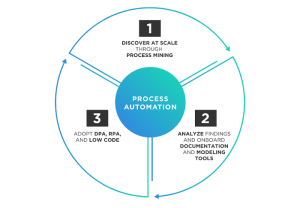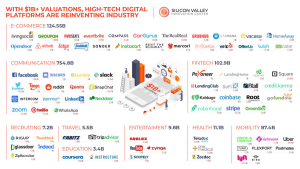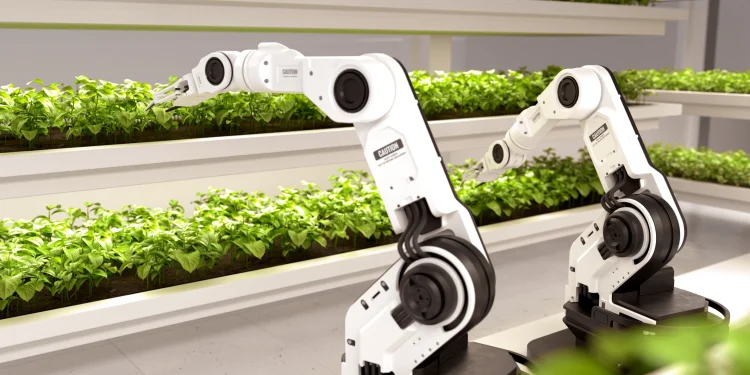Artificial intelligence and robotics are changing the way we do business, from inventing new processes to fixing complex tasks. This is an exciting time for entrepreneurs, posing new challenges and opportunities.
Highlights:
- Entrepreneurship as a process needs to adapt and evolve, with automation being an integral part of the evolution.
- Digitalization is a significant factor in the transition and evolution of skills required for entrepreneurship as automation becomes more integrated into business operations.
When we think of the 21st century, we often consider the advancement of science and technology as a critical aspect. Recently, there has been intense research in artificial intelligence (AI) with robotic systems replicating human behavior. These robots have convinced many people that computers possess intelligence comparable to human beings. The relentless march of AI and robotics transform entrepreneurship, develops new business processes, innovative ideas, and products, and resolves complex tasks. AI has already made its mark in many industries, from self-driving cars to automated customer service. While this is an exciting time for business owners, the rapid pace of change poses new challenges and opportunities. Learning how to navigate this digital transformation will be critical to a successful future.
The Effects of Automation on the Processes and Ideologies of Entrepreneurship

Entrepreneurship is also affected in a world where automation is increasingly becoming the norm. This can be seen in the way that processes are changing and evolving, as well as in the ideologies that entrepreneurs are beginning to embrace.
On the one hand, automation makes many processes more efficient and streamlined. This can be a huge benefit for entrepreneurs, who often try to do everything themselves and use all the help they can get. Additionally, automation frees entrepreneurs to focus on more important aspects of their business by taking care of repetitive and time-consuming tasks. In addition, automation can help entrepreneurs meet the demands of their customers. Customers demand faster service and more convenience, and businesses that do not keep up with these demands will see a loss in revenue. Automation can help enterprises create products and services that cater to these demands. Automation also allows businesses to cut costs by reducing operational expenses and development costs. This may be a major advantage for startups and small businesses without the resources to fund such activities. Likewise, startups can outsource some of their operations using automation tools, focusing on developing their product or service.
Moreover, automation can be an essential part of a business’s growth strategy. Technological advances are a vital part of the evolution of business. Automated inventory management, for example, helps companies operate more effectively and efficiently by managing their stock levels and making sure that it is delivered to the right locations at the most convenient times. In addition, working with automated documents or processes allows employees to focus on higher-value activities that provide greater returns on investment (ROI). Automation also plays a vital role in scaling up a company’s operations and improving customer experience. The road to successful growth for a business has been paved with the use of automation technologies, which have helped businesses across various industries, e.g., inventory management, supply chain, manufacturing, etc.
On the other hand, automation has its downsides. Automated processes can easily be misused, introducing security vulnerabilities into the system. Failing to implement automation properly may lead to wasted resources, increased costs, and inefficiencies. Cybercriminals, aiming to benefit from companies’ poor security posture, either try to exploit automation vulnerabilities themselves or cause automated processes to fail, leading to massive costs incurred by the business. Security operations teams keep finding challenges to protect automation environments, including monitoring their integrity, ensuring the processes’ security, and protecting against cybercriminals. As automation begins to replace human workers in various industries, it could have a negative impact on employment opportunities. The adoption of automated technology has already resulted in a significant “structural shift” in employment where jobs are lost for some types of workers.
For more information on robotics and technology-enabled entrepreneurship, read “The Future Paradigm: Artificial Intelligence and Robotics Transform Entrepreneurship.”
The Future of Entrepreneurship
The future of entrepreneurship is inextricably linked to the future of automation. As automation technologies continue to develop and advance, they will increasingly enter into and disrupt traditional sectors of the economy. This presents a significant opportunity for entrepreneurs to identify these changes early and adapt their businesses accordingly.
In many cases, automated technologies create entirely new industries and business models. For example, the rise of autonomous vehicles will likely lead to a boom in on-demand transportation services. Entrepreneurs who are able to identify this trend early and develop the necessary infrastructure and services stand to reap substantial rewards. Of course, it is impossible to predict the future with any degree of accuracy. Even so, there are several undeniable trends that entrepreneurs should keep in mind as they pursue their ambitions. The following developments are likely to significantly impact business in the coming years and should be considered when developing new products and services. While AI has been around for decades, it is only recently making significant strides toward truly intelligent machines. This is primarily due to advances in deep learning algorithms and the availability of massive datasets. As these trends continue, we are likely to see an increased number of businesses leveraging AI to transform their offerings in creative and unexpected ways.
For example, Netflix recently announced the creation of a new division called Netflix Research. This division dedicates itself to exploring the possibilities of cutting-edge technology for entertainment purposes. While most of its efforts are still under wraps, this initiative likely includes deep learning and machine learning research. Another example is Alphabet’s DeepMind which employs a large number of researchers dedicated to AI projects. From a consumer perspective, we should see several innovative products such as self-driving cars and robots that perform many household tasks quickly and efficiently. From an industry perspective, we should see more companies adopt automation to reduce costs and improve efficiency. The industrial internet has already begun connecting machines to the internet by leveraging sensors and software.

Similarly, the Industrial Internet of Things (IIoT) connects sensors and software to machines in order to improve efficiency and productivity. In the next five years, a number of new AI-related breakthrough technologies and tools will be released, including natural language processing (NLP), computational chemistry, human-like intelligence, molecular biology and genetics research, and computer vision. A significant portion of these developments is funded by major IT companies, such as Google, IBM, Microsoft, Facebook, and Amazon. Overall, the future of entrepreneurship is closely linked to the future of automation. Those who can identify trends early and adapt their businesses accordingly will be well-positioned to succeed in the years ahead.
For more information on the future of business, see “The Future of Business and Entrepreneurship: Do Not Be Left Out.”
Final Thoughts
We live in an age of automation, and entrepreneurship is changing as a result. What used to be a field dominated by solo operators is now being taken over by tech-savvy teams who utilize tools like AI and robotics to get an edge on the competition. This shift has its challenges but also presents opportunities for those willing to embrace change. With the right mindset and approach, entrepreneurs can identify and explore opportunities and create businesses that thrive despite the challenges posed by automation. By staying focused on their goals, being adaptable to change, and embracing new technologies, entrepreneurs can find success in the age of automation.










Discussion about this post